News & Stories
Learning while developing solutions for corporate partners
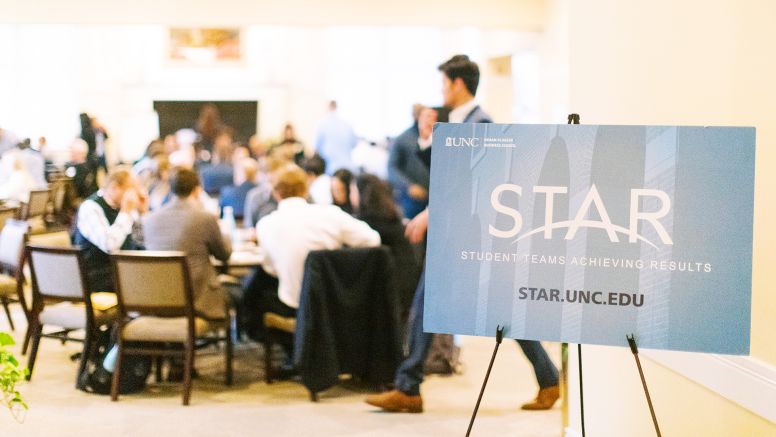
Imagine being a business student conducting market research that you share with executives of a major pharmaceutical company. Or maybe interviewing moms in China to report back to a multinational firm. Or flying in a HondaJet to get a sense of the product and learn about the company culture.
These are examples of students’ experiences in the STAR (Student Teams Achieving Results) program at UNC Kenan-Flagler Business School. They serve as consultants for companies and non-profits to solve complex business issues at a fraction of the cost of a professional consulting firm.
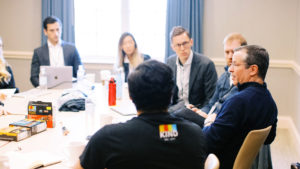 Students apply what they have learned in earlier classes and hone their skills in consulting, leadership, teamwork and project management working on STAR projects. Corporate partners receive data-driven, innovative solutions and actionable recommendations they can immediately implement.
Students apply what they have learned in earlier classes and hone their skills in consulting, leadership, teamwork and project management working on STAR projects. Corporate partners receive data-driven, innovative solutions and actionable recommendations they can immediately implement.
“STAR provides you a disciplined way to structure and approach a problem that is applicable in any field or line of work,” says Alexis Kassees (MBA ’20), a STAR project leader on the HondaJet project. “Additionally, there is the element of working and building relationships with your classmates in a deeper way than other group projects. I enjoyed working with undergrads as well. They bring a great perspective to the table and skill sets that MBAs might not be as strong in.”
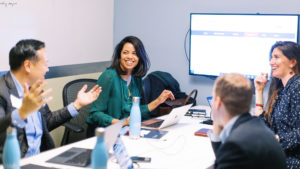 STAR is open to students in all MBA programs and the Undergraduate Business Program. They work together on teams guided by a student leader and faculty advisor during the spring semester. The project experience – for which students earn course credit – includes training in leadership, data collection and analysis, consulting frameworks and presentation skills.
STAR is open to students in all MBA programs and the Undergraduate Business Program. They work together on teams guided by a student leader and faculty advisor during the spring semester. The project experience – for which students earn course credit – includes training in leadership, data collection and analysis, consulting frameworks and presentation skills.
Student teams check in weekly with the corporate partner and faculty advisor, and present their progress three times to corporate partners. Many teams travel and meet with their corporate partners, while a small number conduct their projects exclusively online. With the COVID-19 pandemic, all teams quickly became operational online in March 2020 and delivered stellar results to 23 corporate partners.
STAR projects span industries. Past projects range from GlaxoSmithKline (GSK) to Red Hat to the North Carolina government and NASCAR. One team provided insights about the baby diaper market in China to Procter & Gamble. They traveled to China to interview mothers and shared their findings with P&G leaders at Cincinnati headquarters.
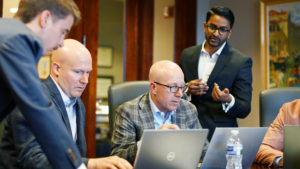
Ritch Allison with the Domino’s STAR student team
Teams also worked with Domino’s CEO Ritch Allison (BSBA ’89, MBA ’95) and KIND Healthy Snacks CEO Mike Barkley (MBA ’93).
The KIND project was one that had to go virtual in March. “Fantastic work by a fantastic team,” says Barkley. “We at KIND were blown away by the thoroughness and quality of the work. We were equally impressed with how the STAR team operated in a highly collaborative fashion and with incredible enthusiasm.”
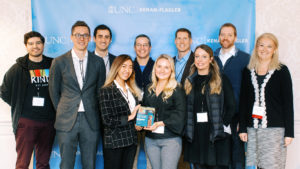 “Mike Barkley and his colleagues provided a once-in-a-lifetime learning experience the students will never forget,” says Claudia Kubowicz Malhotra (MBA ’00, PhD ’06), faculty advisor and a marketing professor. “A STAR project is a highlight of the education experience at UNC Kenan-Flagler. Students benefit from working on a real-world project with both immediate and long-lasting value to the corporate partner. They learn more when they can apply what they learn in the classroom to real-world business problems. And the coaching and exposure students receive from their corporate partner is invaluable to their learning and growth.”
“Mike Barkley and his colleagues provided a once-in-a-lifetime learning experience the students will never forget,” says Claudia Kubowicz Malhotra (MBA ’00, PhD ’06), faculty advisor and a marketing professor. “A STAR project is a highlight of the education experience at UNC Kenan-Flagler. Students benefit from working on a real-world project with both immediate and long-lasting value to the corporate partner. They learn more when they can apply what they learn in the classroom to real-world business problems. And the coaching and exposure students receive from their corporate partner is invaluable to their learning and growth.”
As the executive director of STAR, Karin Cochran (MBA ’99) is a true believer. A professor of the practice of strategy and entrepreneurship, she also teaches the Consulting Skills and Frameworks course that is a prerequisite to participating in STAR.
But she was a client before she had a leadership role at UNC Kenan-Flagler. She engaged STAR for multiple projects when she worked for the state of North Carolina and BCBSNC.
“My colleagues and I had new ideas but did not always have the capacity or time to investigate,” says Cochran. “Students have more flexible schedules with the capacity to conduct interviews and could bring new, creative solutions to our team.”
Kevin Rodriguez (BSBA ’20) worked with a large pharmaceutical firm to improve the webinar experience for healthcare practitioners. The faculty advisor had worked for the company so could give specific advice to the team.
He and his teammates navigated how to communicate with senior executives, which requires finesse, he says. After all, students sometimes need to provide constructive criticism to the organization to achieve the desired results.
“I will be that much more confident when I begin my full-time job at Boston Consulting Group,” he says. “It was perfect preparation for consulting, but the experience would be helpful to anyone in any career.”
 Rodriguez valued the uncommon experience of MBA and Undergraduate Business students working together. “It was awesome to learn from MBAs and work alongside them,” he says. “They learned from us, too. We were all equal teammates.”
Rodriguez valued the uncommon experience of MBA and Undergraduate Business students working together. “It was awesome to learn from MBAs and work alongside them,” he says. “They learned from us, too. We were all equal teammates.”
Students gain valuable work experience that they can share with potential employers. The skills and confidence they develop during a STAR project are part of their toolkit throughout their professional careers.
“The skills you learn you will apply directly in your internship or full-time job and continue to refine your problem-solving skills,” says Kassees. “It also is an opportunity to learn about a company in a unique way.”
Students test their skills and demonstrate their value. And corporate partners gain insight that can lead to better business outcomes.

STAR students in a team building exercise
“Our corporate partners appreciate receiving innovative and action-based recommendations,” says Julia Kruse, a director of STAR. “Students provide fresh perspectives and data-driven recommendations to a business challenge.”
For instance, Franklinton Center at Bricks, a nonprofit social justice conference and retreat center, hired a STAR team to determine how to transition from relying on a grant to supporting itself. Students came up with a plan to increase the organization’s income by $150,000 per year. By implementing their recommendations, the nonprofit successfully earned $150,000. The center is so pleased with the results they are working with a second STAR team.
STAR is a unique experience for students to advance their careers. “We manage STAR like a mini-consulting firm, we engage students interested in developing their leadership, problem solving and teamwork skills,” says Cochran.
“Whether or not you’re interested in working in consulting, those skills are vital,” says Rodriguez. “They are transferable to any career and can’t be attained in a lecture classroom. The STAR project didn’t feel like a class. It was a working opportunity.”